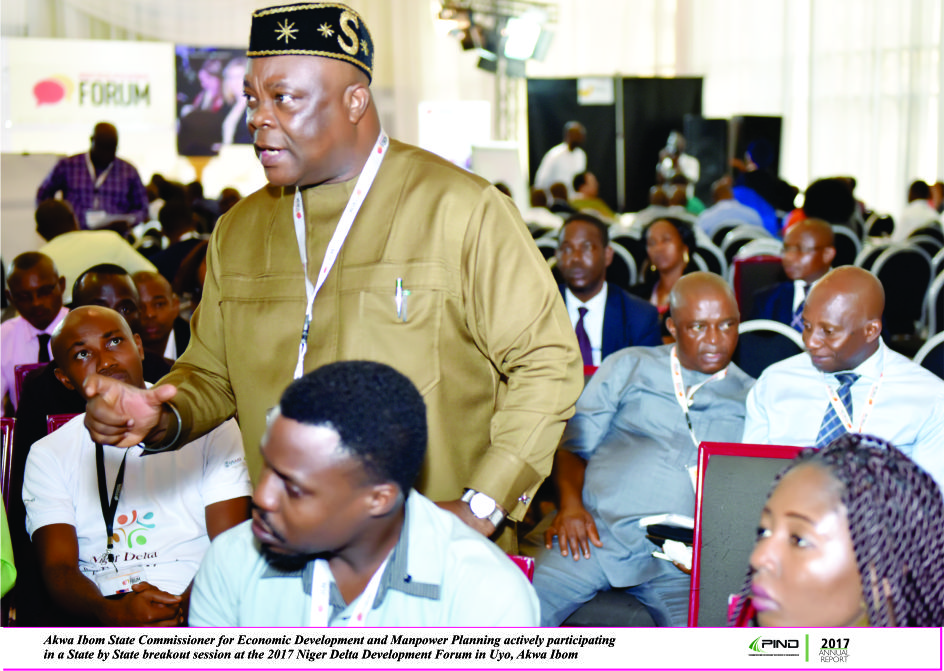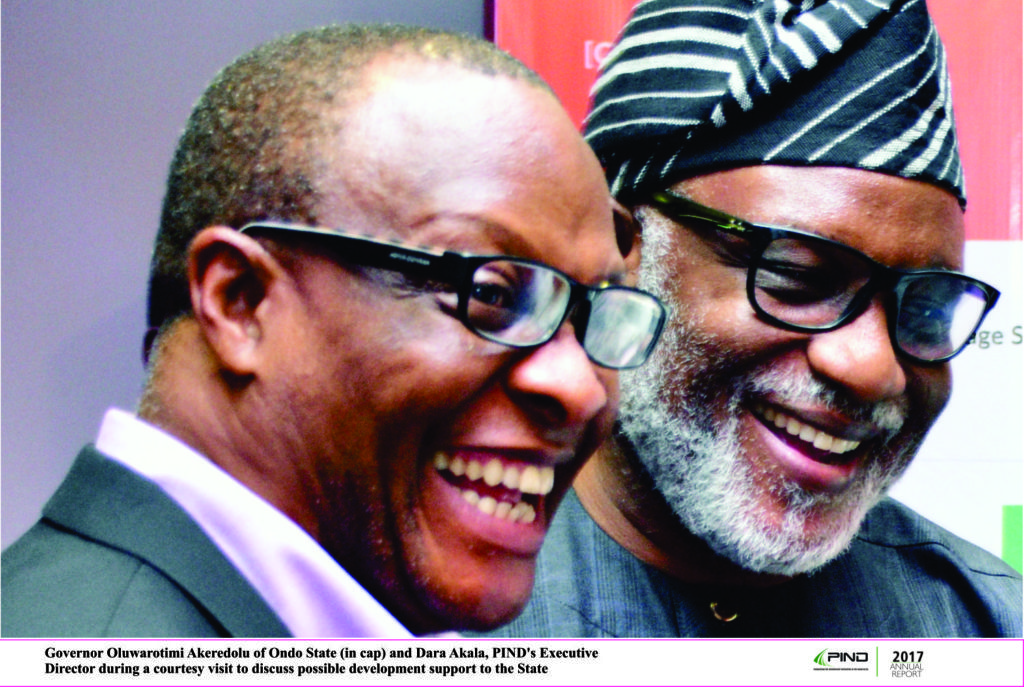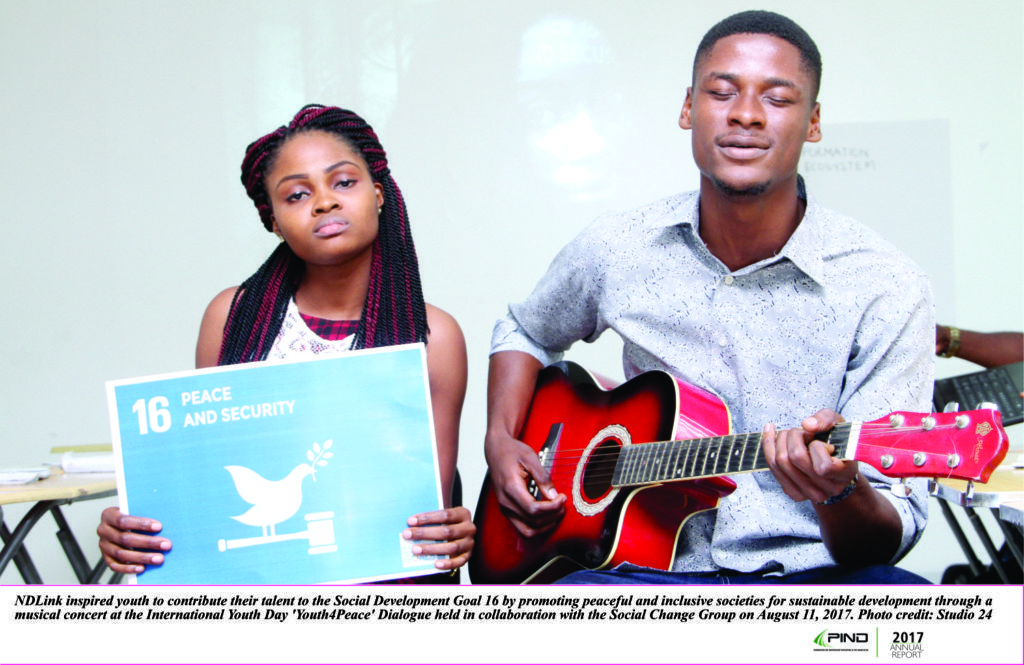
We work to influence development policy and practice and create an enabling environment for growth through data-based analysis and understanding of systemic constraints to the growth in the Niger Delta region. Accurate socio-economic information and better-informed stakeholders are vital to this.
Partnerships with Regional Governments to Catalyze Inclusive Economic Growth in the Niger Delta.
Informed governments can promote inclusive and equitable economic opportunities in the Niger Delta through their decisions, policy and approach. PIND continued to show itself as a high value partner with various State governments and agencies across the region as we partnered and engaged with them throughout the year.
Enhancing Niger Delta Development Commission (NDDC)’s regional development approach – Following a signed Memorandum of Understanding (MoU) with the Commission in May, 2017, we are supporting the regional institution in project identification, design, implementation, project monitoring and evaluation that will stimulate the private sector while providing a sustainable approach to pro-poor economic and social development. A successful partnership will help catalyze the development of various agricultural value chains and support the NDDC in building the foundational elements of economic development in the region around research, analysis, governance, advocacy, and peacebuilding and conflict resolution, with special attention to the needs of women, youth and marginalized groups.
Developing Cross Rivers State Government 30-Year Growth and Development Plan – We continued to partner with the State Planning Commission (SPC) to produce a bottom-up plan for achieving the long-term development goals of the State Government that takes into account current and expected future realities by the end of 2017. The development of this plan, which we began in 2016 after an MOU with the Cross Rivers State Government (CRSG) for providing development assistance, became a rallying point for development stakeholders to collaborate in 2017. Seven (7) stakeholders working in the region – European Union (EU), BRACED Commission, DFID, USAID, Niger Delta Dialogue Committee, the Henrich Boell Foundation and the Nigeria Governors Forum (NGF) – teamed up with PIND to support a baseline diagnostic assessment of the State, and visioning and modelling workshops with the active participation of key stakeholders that informed the draft plan.
Influencing Delta State’s Job Creation Model – Our support to the Chief Job Creation Officer and Office of the Executive Governor to develop sustainable aquaculture projects has led the State to adopt a new cluster approach for its job creation efforts, with hundreds of direct jobs created in the aquaculture as a result. Previously, the State Government supported agricultural programs by distributing starter packs on the specific value chains to beneficiaries who are scattered in different locations – an approach which made monitoring and coordination difficult. With the cluster approach, farmers in the State evolved into cooperatives that can easily attract private sector investment, access finance from financial institutions for support beyond the government program, and attract the attention of extension services for shared learning and access to information.
Additionally, in the area of access to finance and Small and Medium-sized enterprises (SMEs) development, the partnership with the State’s Micro, Small and Medium Scale Enterprise Development Agency is strengthening their loan delivery and management capacity, as well as their ability to track and report impact. This is ensuring that the right businesses are getting funded.
Organizational strengthening of Ondo State Oil Producing Areas Development Commission (OSOPADEC) – Upon request from OSOPADEC, we signed an MOU to support the organizational strengthening of the Commission to become more effective in the achievement of its mandate in the State and to design targeted investments for economic development in the State that will underpin the budgeting and allocation of resources for priority projects.
Producing Akwa Ibom State Agricultural Policy and Food Sufficiency Strategy – PIND partnered with the New Nigeria Foundation and other development partners to produce the policy aimed at aggressively harnessing the agricultural potentials of the State for food sufficiency, job and wealth creation through agricultural production, processing and marketing.
Assessing Ondo State Investment Readiness – We assisted the State to conduct a structured and professional assessment of its investment readiness using widely-acclaimed measurement parameters and methods. The State Government is using the report to attract private sector investment into core agricultural value chains as well as other key sectors as a basis for its long-term sustainable economic development.
Reviewing Edo State Agricultural Policy – To strengthen the agricultural potential of Edo State and ensure that meaningful private and public sector investments are attracted, PIND collaborated with the State Ministry of Agriculture and the PIND-USAID co-funded Strengthening Advocacy and Civic Engagement (SACE) project to do an extensive review of the existing State policy on agriculture. This identified current gaps and assessed its overall impact on the development of this critical sector in the state.
Facilitating Rivers State Post Primary School Water, Sanitation and Hygiene Policy – Several follow-on engagements with the Rivers State Senior Secondary Schools Board had the Agency adopt a new policy to establish environmental health clubs in all the 258 senior secondary schools in the State. This marked a milestone towards influencing behavioral change in sustaining improved water, sanitation and hygiene (WASH) in senior secondary schools.
Our advocacy engagements and support to Governments in 2017 contributed to the development of 16 policy papers, briefs and plans towards delivering enabling environment for sustainable and equitable socio-economic growth, making a total of 35 briefs from 2010 till date.

Platforms for Regional Development Discourse & Collective Action.
Addressing the complex development challenges of the Niger Delta is beyond what a single organization can take on. It requires collaboration, coordination and connections amongst relevant stakeholder groups, at federal, regional, State and community levels. We provided various platforms for such to take place over the course of the year
Nigerian Economic Summit – In October, 2017, PIND recorded a key milestone, teaming up with the Nigerian Economic Summit Group (NESG) and the Market Development (MADE) Project in the Niger Delta to organize the NESG’s annual high-profile Summit’s first ever discussion session focused on the Niger Delta. Themed “Low Carbon Investment Opportunities for Economic Recovery and Growth Plan (ERGP) in Niger Delta Communities”, the outcomes of the session became part of the policy recommendations made to the Presidency from the Summit and these outcomes were also fed into the 2017 edition of PIND’s annual Niger Delta Development Forum (NDDF), thereby linking the NESG at a federal level with this regional audience for the first time. In addition, it birthed the Low Carbon Investment in the Niger Delta Initiative that has diverse stakeholders from multi-sectors including the private sector currently collaborating to scale up the agro-allied sector and reduce post-harvest losses by bridging sector value chain gaps in emerging economic ecosystems.
Niger Delta Development Forum (NDDF) – The 2017 edition of our annual forum in Uyo, Akwa Ibom State between November 14 and 15 again showcased PIND’s convening power as an organization. It brought together key actors from each of the States in the Niger Delta, along with private sector and civil society actors, to create the beginnings of short, medium and long-term development plans for each State that we will be developing further in the coming year with willing States. This was done in partnership with the Department for International Development (DFID) South-South/South-East regional office, DFID Market Development Program (MADE), the European Union Niger Delta Support Program (EU-NDSP), DFID Facility for Oil Sector Transparency and Reform (FOSTER) project, Catholic Organization for Relief and Development Aid (Cordaid), United States Agencies for International Development (USAID), Nigerian Economic Summit Group, and Henrich Boell Foundation This 6th edition of the forum, titled ‘A State-Led Framework for Planning & Development in the Niger Delta’ created awareness and shared understanding among stakeholders on the necessity and methodologies for long-term strategic planning and implementation for domestic resource mobilization, inclusive and resilient regional growth.
NDDF 2017 Participants Profile
- 282 participants (193 males, 89 Females)
- 4 participants from Federal MDAs
- 99 participants from Niger Delta States MDAs
- 21 participants from the Media/Creative Industry
- 38 Participants from International Development Agencies
- 48 participants from the Civil Society Organizations,
- 35 Private Sectors Investors
- 37 independent consultants.
Donor and Partners Coordination Meetings – Working together with the United Kingdom Department for International Development (DFID) South-South and South-East regional office and the DFID Market Development (MADE) program in the Niger Delta, we facilitated three coordination meeting of donors and implementing partners working in the Niger Delta that produced a suggested structure and mechanism for coordinating and harmonizing development efforts in the region for greater collective impact.
NDLink – To ensure the availability of credible data to drive development programs, PIND relaunched NDLink, our one-stop online platform for development-related information and resources on the Niger Delta. We diversified the content featured on the platform, which resulted in nearly two million visits to the platform within the year and more people being more aware of development information in the Niger Delta. This increased engagement on NDLink has also contributed to a changing narrative of development within the Niger Delta as more people now show interest in learning about and ‘discussing’ development on the platform.

Our 2017 advocacy platforms brought together over 800 stakeholders from different sectors and the public to connect with one another to discuss Niger Delta development issues and explore collaboration opportunities. This yielded nine (9) new strategic stakeholder collaborations that are collectively pursuing improved development policies and practices in the Niger Delta and facilitated N7,700,000 in direct investments to the region, which sums up to N299,700,000 worth of investments from 2010-2017.
DOWNLOAD REPORT HERE PIND 2017 Annual Report (4302 downloads )



